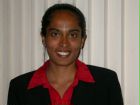The Kirkland Project for the Study of Gender, Society and Culture continued its 2003-2004 series, "Technology, Science and Democracy" with a panel discussion on September 25. Four guest speakers shared their work and views on "Building Communities Across the Digital Divide."
The first speaker was Mary Bernadine Dias (Hamilton '98), Special Faculty at the Robotics Institute of Carnegie Mellon University. Dias is involved in a project called Tech-Bridge, which aims to make Carnegie Mellon's academic research in technology have a greater impact on the world, specifically in developing countries. By helping to build the information communication technology infrastructure in these regions, Tech-Bridge hopes to make a contribution to the allieviation of global poverty and the reduction of the digital divide. Dias spoke about plans for the project, which is still in its opening phases, and ways in which they hope to bring technology to several target areas of development: indigenous industries, education, health care, communication, information access, and safety and security. Dias also spoke about how the Tech-Bridge project is being integrated into the Carnegie Mellon curriculum through classes and a proposed Technology Peace Corps made up of CMU students.
Ellen McDermott continued the panel discussion by speaking about her experience founding BusyInternet, a technology center in Ghana, West Africa. BusyInternet, which opened in 2001, was founded to bring technology tools and access to the people of Ghana, and currently has the fastest internet connection available in the country. In addition, BusyInternet is the landlord for small IT startups and advocates policy changes that would benefit IT in the nation. McDermott spoke about her experience in bringing technology and Western business practices to a developing nation. She pointed out that, despite BusyInternet's success, bridging the digital divide in nations such as Ghana is a difficult endeavor, and that its full effects will take years, if not decades, to be seen.
The next speaker was Marianne Petit, a multimedia artist and teacher at NYU's Interactive Telecommunications Program, which aims to create innovative uses for new technologies that will help groups without access to information technology. Petit spoke about the Project's attempts to provide access, as well as useful content, to non-profit organizations. Some of the examples she gave were an online system to help abuse victims file for protection orders more easily, dispersing handheld devices to community groups, and retrofitting a children's hospital with plasma screens and wireless computer technology. Petit's talk pointed out that a digital divide exists in the United States as well as abroad, and that there are many groups right here for whom increased access to technology could be helpful.
The last speaker was David Hakken, an expert on cyber anthropology from the SUNY Institute of Technology. Hakken spoke more broadly about the societal condition of the digital divide, providing an interesting context for the other panelists' talks. He pointed out that there are multiple aspects of what we conveniently refer to as "the digital divide", including an access divide, a content divide, and what he called a social functioning divide, where the use of technology actually creates new social stratification. He talked about the "tech-push" culture which can impose technology upon people who have no use for it, particularly when there is no content for them to access with technology. He also discussed the societal effects of proprietary vs. open-source computing, his area of research. Overall, Hakken's talk was an appropriate way to end the panel by looking at the theory behind what we call "the digital divide."
The Kirkland Project will continue the "Technology, Science and Democracy" series with Dick Teresi's talk on the origins of contemporary science in non-European cultures, titled "Whose Science?", on October 22nd at 7PM in the Fillius Events Barn. For more information, visit the Kirkland Project Website.
 |
| M. Bernadine Dias '98 |
This story written by Caroline O'Shea '07.
Previous News Stories on this Series: Opening Panel on Sept 10 2003
Posted September 27, 2003
